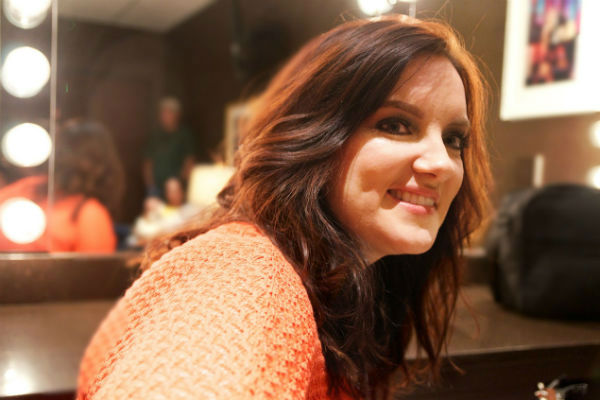
Brandy Clark looked to be right on trend when the video for her rockabilly-goosed track “Stripes” premiered on July 4. There were scenes of her pistol-cocked confrontation with a cheater in the act, mussed-hair mug shot poses and attempts to cope with life in lock-up, including an insultingly orange prison suit. Exactly a week later, Netflix started airing its buzzy, new drama Orange Is The New Black, putting the topic of women in prison squarely on the pop culture radar.
Videos by American Songwriter
“I get a lot of texts: ‘Oh my God. Have you seen Orange Is The New Black?’” Clark says. “I’ve even gotten a few people that are like, ‘Hey, did you write that about that show?’ I’m like, ‘No, this was [written] a long time ago.’”
It doesn’t take long for any illusion of Clark as a heatseaker-songwriter to disappear. Really, she’s a stubborn but sanguine country traditionalist, the sort who’ll dig in her heels and wait for the genre’s popularity pendulum to swing back toward sturdy, unshowy storytelling staples, as the late sociologist Richard Peterson said it inevitably will in his seminal work Creating Country Music.
Not that Clark’s been guided first and foremost by academic theory. She got an education in the keenly down-to-earth expression of Merle Haggard and Loretta Lynn from her grandparents while growing up in a logging town in Washington state. “Most people think of Seattle, coffee and Nirvana,” she says. “But where I grew up, it’s as country as it gets. Nine to 12 hundred people, depending on the economy, all blue-collar, good people.”
During the ’90s, Clark became taken with the exquisite earthiness and emotional heft she heard in the repertoires of Patty Loveless and Trisha Yearwood. Eventually she started singing their stuff with her cover band, even as she took notice of names behind the songs – names like Gretchen Peters and Matraca Berg – and tried her own hand at writing.
After moving to Nashville for college, she got as far down the artist road as head shots and demos before concluding the fact that she’d much rather get down to the business of crafting a verse than get her hair done meant she just wasn’t mainstream performer material.
Right out of college, Clark landed a publishing deal, followed by a long, dry decade, with a fair number of near misses. “I had a song that George Strait was gonna cut,” she says, offering one example. “Held it for months. It was a duet, and he decided at the last minute he didn’t want to do a duet.”
She was well aware that country radio of the ‘aughts favored a more blaring, boisterous breed of song than those she was writing. “There’s a part of me,” she reflects, “that’s envious of people that can just chase whatever’s going on and chameleon into that. I can write with people that do more of that, and they can pull me more that way. But for me, at the center of it, it’s just [about] writing the songs that I write, which I think are about real topics.”
A few years back, some of the real-talk songs Clark was co-writing began to actually find homes on albums by trad-savvy female singers like Reba McEntire, Ashton Shepherd and LeAnn Rimes. Then came a pair of potent number one singles cut by Miranda Lambert and The Band Perry. And if Clark, the suddenly successful, fluff-eschewing songwriter, hadn’t already piqued the interest of country music observers, her contributions to Kacey Musgraves’ casually progressive troubadour set finally got their attention.
Says Clark, “I’ll stick with things probably long after it’s smart to stick with them. It is hard for me to give up on things, especially things I believe in. And I believe in country music. I always thought, ‘It’ll come back around to a more traditional country sound.’ I don’t necessarily think it’s fully swung back to that, but there are shades of that.”
Plenty of songwriters with classic country sympathies have seen the formulaic writing on the contemporary country wall and shifted their energies over to the alternative side of the spectrum, where the right combination of grit and literacy can find an appreciative audience. But Clark’s long-haul commitment to the mainstream inadvertently set her up to be handed her own baby recording career at the age of 35.
She swears she was as surprised by the turn of events as anyone. Her frequent co-writer Shane McAnally had encouraged her to take the wryly unsentimental realism of her song “Get High” and run with it. And at writer’s nights, she’d started getting requests for “Get High” on CD. So she made an EP to sell at shows, which caught the ear of Emilie Marchbanks, a manager with Fitzgerald Hartley, who invited her to make a proper, pro album.
Titled 12 Stories, that collection of frank, witty narratives framed in soulfully supple and spare arrangements is officially out October 22, on tiny Dallas-based Slate Creek Records, but critical acclaim has been accumulating all year long. It’s deserved, too. A singer-songwriter could do worse than having a marquee pop critic at prestigious New York magazine – that’d be Jody Rosen _ declare that hers is his favorite album of 2013, when five whole months were still left in the year.
“When this project was conceived, nobody was cutting these kinds of songs,” says Clark. “But I always felt like there was an audience for them. So what y’all have done is make me see that I’m not wrong there.”
This article appears in our November/December 2013 issue.












Leave a Reply
Only members can comment. Become a member. Already a member? Log in.